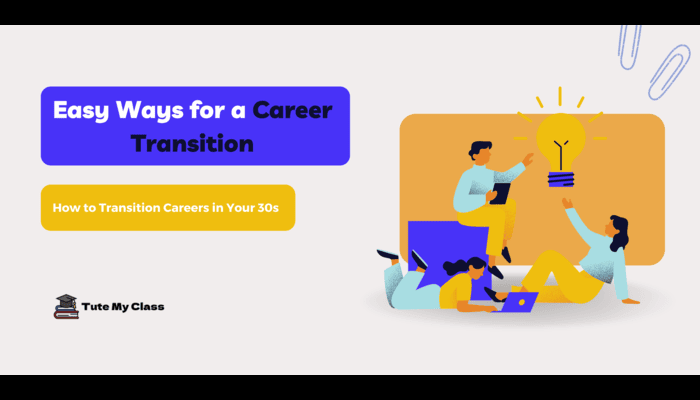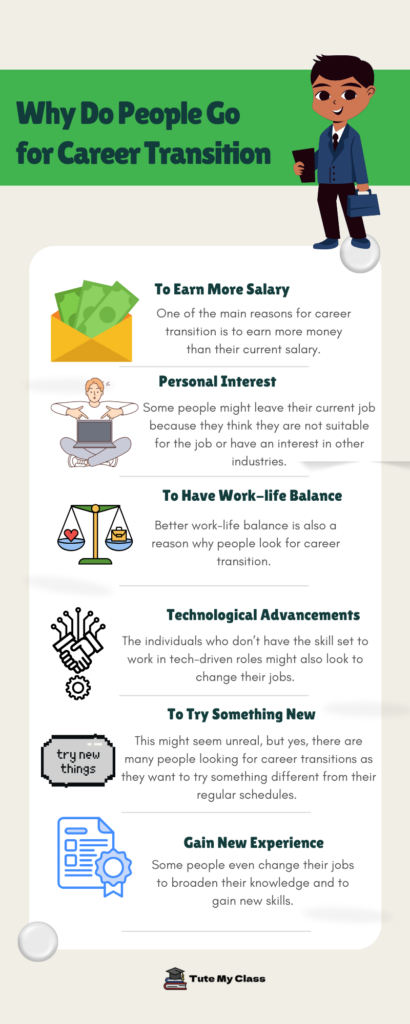
What is career transition? It is a process of shifting from one to another career or industry. Desire for personal fulfillment, better work-life balance, and dissatisfaction, are some of the reason why people want to change their careers. Changing jobs from one to another is no longer considered a daunting task. On an average, a employee changes their jobs at least 12 times in their career. Most of the career changes occur between the ages of 30 and 50. Whether you are looking for transition careers for teachers or for engineers, you can easily do this now. However, before switching your career path, make sure you consider all important points. In this write-up, we have tried to briefly explain all the information that can help individuals in effectively changing their careers.
Continuing your education through online learning is one of the things to do during your career transition. Learning after a gap can be difficult. However, you can seek online class help from professionals to achieve success in your career. The expert’s assistance is the easiest way to learn in-demand skills and fast-track your career change.
Why Do People Go for Career Transition
People might want to shift their because of different reasons. Challenges in their work or the desire to grab better job opportunities are some of the reasons why people want a career transition. A career change can happen at any age. There is no age limit for it. Whether you are in your 30s or 40s, you can possibly look for job change.

The following are some of the reasons why people look for transitions in their careers.
- To Earn More Salary: One of the main reasons for career transition is to earn more money than their current salary. If you feel your salary is less than other job profiles, you can possibly look for changes.
- Personal Interest: Some people might leave their current job because they think they are not suitable for the job or have an interest in other industries.
- To Have Work-life Balance: Better work-life balance is also a reason why people look for career transition. Tight work schedules or more stress in their job can lead people to look for other jobs.
- Technological Advancements: Many industries have evolved with the emergence of new technologies. The individuals who don’t have the skill set to work in tech-driven roles might also look to change their jobs.
- To Try Something New: This might seem unreal, but yes, there are many people looking for career transitions as they want to try something different from their regular schedules. Many engineering professionals leave their jobs and open a new restaurant. There are many industry professionals who start vlogging or open their YouTube channels with the motive of finding a fulfilling job.
- Gain New Experience: Some people even change their jobs to broaden their knowledge and to gain new skills.
Also Read: How to Improve Low Grades in Online Classes
How to Transition Careers in Your 30s
Career transition in your 30s can be a life-changing experience. Younger professionals can easily transition careers and explore different career paths. However, in the 30s, changing careers can be both exciting and challenging at the same time. Here is how someone in their mid-30s can shift careers.
Make A Firm Decision
Before anything else, make a correct decision on what you want to do and how you want to do it. Find answers for your future career plans and what your interested field is and why. Strategic planning of everything will increase your chance of success.
Moreover, analyze and learn about the industry where you want to work. Some careers can be easier while others can be complicated to enter. Hence, verify whether your chosen career can provide strong salaries, good work-life balance, and stable career prospects or not. If you are switching careers, do not forget to consider this job options
- Substance abuse counselor
- Web developer
- Information security analyst
- Software engineer
- Finacial advisor
- Human resource manager
- Market research analyst
- Project manager
- Dental hygienist
- Registeres nurse
Identify Your Transferable Professional Skills
Transferable skills are the ones that can be used in different careers and jobs. If you are looking to change your career, you need to first identify your transferable skills. Identify which of your current skills are transferable to the new career.
Critical thinking, problem-solving, communication, teamwork, and management are some of the transferable professional skills.
Learn New Skills
Learning new skills is one of the best ways to meet your future career needs. It will help you work according to the industry demands and meet your client’s needs. Acquiring new skills will help you move forward into the next phase of your career. Data analysis, web development, and project management are some of the high-income skills that you should gain.
Developing new skills in your 30s might be difficult. However, online classes are one of the best flexible options to learn new professional skills at an affordable price. You can continue to learn while working without compromising on anything. Let’s suppose you are someone looking for a shift in your accounting career. You can start learning skills by enrolling in accounting courses. There are many free and paid accounting courses offered on online learning platforms. Moreover, you may seek online accounting class help from professional writers and increase your chances of scoring top grades. A simple query request such as can someone do my online accounting class? will help you hire the best online class takers for your assistance.
Build your Network
Networking is one of the best ways for career transition in your 30s. Build connections with other industry professionals. Seek advice and mentorship from top industry professionals before entering into a new field.
Follow Your Passion
According to a recent survey, 60% of people do not pursue their passion in their career. Many students enroll in courses following the crowd and get into working in jobs they are not passionate about and look for career transition. No financial stability, lack of clear direction, and fear of failure are some of the reasons why people choose the wrong careers. Students in competitive fields like nursing often join the industry for its job prospects, but many struggle due to a lack of interest or the complexity of course material. Difficulty in learning some even look for external help with queries like, Help me take my online nursing class for me.
If you also choose the wrong career path with less interest, then working in that field might be difficult. However, no need to worry anymore. By transitioning in your career, you can get the opportunity to follow your passion and choose the right career field for you. Find out what you like to follow your passion and work in the career you want without any pressure.
Do you want a career transition to move one step closer to your dream career? Transitions in careers are of many types, like shifts in industry, changes in departments, or finding new job roles. A career shift can take time; you should not expect immediate results. You need to be patient to navigate success. Moreover, also be aware of the challenges, as switching careers can be daunting.
Steps for a Successful Career Transition
Do you think that the career transition process is intimidating? Do you want to have a career shift but don’t know how to begin with it? Here is the breakdown of what you need to follow to have a change in your career.
- The first step is to leave your current job. Once you resign from your current job, you can start searching for other jobs with a fresh mind. Employers recommendations are important. Make sure you end your job with a good note.
- Join a school if you lack the skills or knowledge to work in a new industry. Complete certification courses online to learn important industry skills. There are many professional skills available on the online learning platforms. Find courses aligning to your career goals to experience in the next stage of your career.
- Connect with industry professionals offline and online. Learn more about your new career path. You can attend industry events to build connections with new people and grab better opportunities.
- Update your resume as per your recent skills and qualifications. Highlight your existing skills and experience according to your recent career goals.
- You can update your personal profile on LinkedIn or build a portfolio reflecting your current experience.
- If you are moving forward to a completely new industry, start applying to entry-level job positions. It will help you gain experience in the new field. You can take part-time jobs or start freelancing to work your way up to the level you desire.
Entering into a new industry for career transition is not an easy process. You cannot expect immediate success. Be ready to spend years learning about your new industry and gaining experience. Once you gain experience, you can find a job easily.
Also Read: Why Online Learning Is Becoming Popular These Days
Frequently Asked Questions
| Question: What is a career transition? It is a process of shifting from one to another career or industry. Desire for personal fulfillment, better work-life balance, and dissatisfaction, are some of the reason why people want to change their careers. |
| Question: What is the transition period in a career? Answer: It can be a few days or weeks, and in some cases, the transition period can also take a few months or years. |
| Question: What are the challenges of career transition? Answer: Skills gaps, financial uncertainty, and employer bias are some of the challenges of transition careers. |
